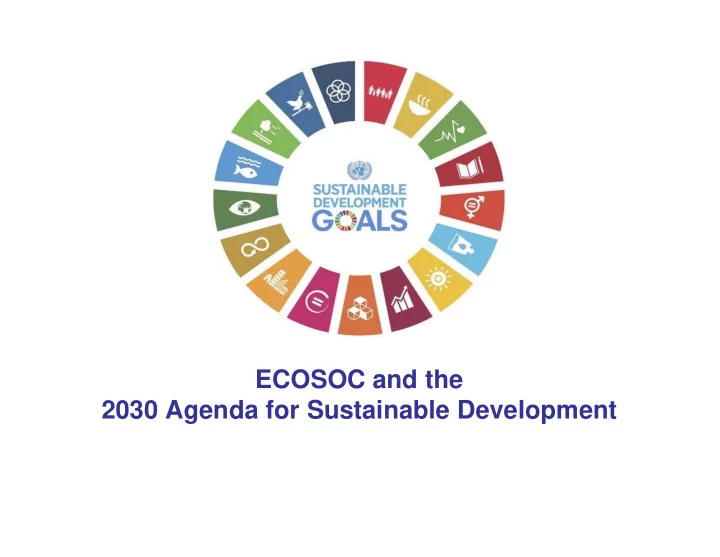

United Nations ECOSOC and the 2030 Agenda for Sustainable Development
Interlinked nature of the SDGs Source: David Le Blanc, DESA Working Paper No. 141
Interlinkages of SDGs • The interlinkages of Sustainable Development Goals means that they will need to be pursued in an integrated manner, rather than individually or sequentially. • For example, SDG 1, End poverty in all forms everywhere, establishes the income level of $1.25 per day as a minimum for everyone, • including through social protection systems (target 1.3), • as well as global action to enhance the resilience of the poor and those in vulnerable situations and reduce their vulnerability to climate-related extreme events and other economic, social and environmental shocks and disasters (target 1.5). • Action to mitigate and adapt to climate change is therefore also part of realizing SDG 1
Overall role of ECOSOC • The Council serves as a platform for countries to share their early experiences in aligning their national policies with the 2030 Agenda • Offer opportunities to share, learn, innovate, mobilize support, form partnerships and work together • Provides technical guidance and policy advice for results • Promotes innovation and lessons learned in reviewing progress to adjust policies and practices
Format and working methods of the Council Based on General Assembly resolution 68/1 (September 2013) on the strengthening of the Economic and Social Council: • focuses the analytical work of the ECOSOC system around a main theme • requests Council to ensure harmonization and coordination of agendas and work programmes of the functional commissions • develops responses to emerging development challenges • Integration Segment - bring together key messages from Council system on main theme and develop action-oriented recommendations • ensures stakeholder engagement throughout the ECOSOC cycle
Council Working methods (cont.) Composition and duration of Council membership • 54 Members, elected by the General Assembly for two-year terms, based on geographical representation Composition and regional representation of Bureau • President and Bureau members represent the five regional groups Presidency • Rotation among regional groups
Council Working methods (cont.) • 30 UN bodies that have a direct reporting relationship to the Council ˗ eight functional commissions ˗ five regional commissions ˗ three standing committees ˗ one ad hoc body ˗ eight expert bodies and ˗ four related bodies • ECOSOC reviews the work of another 14 standing bodies that report formally to the GA • Approval of reports by Coordination and Management Meeting
How to follow-up and review implementation? • Elements of global follow-up and review include: – long-term orientation – inclusiveness – broad participation – transparency – building on existing platforms and processes, with active support from the UN system and other multilateral institutions
ECOSOC follow-up and review • Supports follow-up and review of the SDGs through annual main theme and its forums, segments and instruments, including: – High-level Political Forum (under the auspices of ECOSOC and the General Assembly) – ECOSOC High-level Segment – Forum on Financing for Development – Multi-stakeholder Forum on Science and Technology – Development Cooperation Forum
Adjustments within the ECOSOC system • Commission for Social Development – Support to thematic reviews of HLPF – Reports on social aspects related to ECOSOC main theme • Commission on Population and Development – Multi-year work programme aligned with ECOSOC main theme and thematic focus of HLPF • Commission on the Status of Women – Reports on aspects relating to gender equality and empowerment of women of ECOSOC main theme – Focus on emerging issues relevant to ECOSOC cycle and main theme • UN Forum on Forests – Standing agenda item on thematic and operational priorities, taking into account review cycle of HLPF
General Assembly review of resolution 68/1 during its 72nd session The President of the General Assembly has appointed two co- facilitators: • H.E. Mr. Einar Gunnarsson, Permanent Representative of Iceland • H. E. Ms. Alya Ahmed Saif Al-Thani, Permanent Representative of Qatar Review of 68/1 will begin on 6 February 2018.
General Assembly review of resolution 68/1 during its 72nd session (cont.) The Co-facilitators have identified the following initial questions to frame the review: • How to approach the review of 68/1 in order to cover its substantive and structural aspects? • How to ensure that the review takes into account related processes but without overburdening its focus? • How effectively is the Council generating, including through its annual main theme, the needed leadership, strategic direction and specific guidance? • How can the Council augment the added-value coming from the various interlinked functions of the ECOSOC cycle? • Are there changes to be made, within and/or across these functions?
Recommend
More recommend